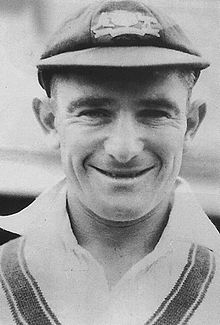Sid Barnes
 |
||||||||||||||||||||||||||||||||||||||||
| Personal information | ||||||||||||||||||||||||||||||||||||||||
|---|---|---|---|---|---|---|---|---|---|---|---|---|---|---|---|---|---|---|---|---|---|---|---|---|---|---|---|---|---|---|---|---|---|---|---|---|---|---|---|---|
| Full name | Sidney George Barnes | |||||||||||||||||||||||||||||||||||||||
| Born |
5 June 1916 Annandale, New South Wales, Australia |
|||||||||||||||||||||||||||||||||||||||
| Died | 16 December 1973 (aged 57) Collaroy, New South Wales, Australia |
|||||||||||||||||||||||||||||||||||||||
| Nickname | Bagga Suicide Sid |
|||||||||||||||||||||||||||||||||||||||
| Batting style | Right-hand batsman | |||||||||||||||||||||||||||||||||||||||
| Bowling style | Right-arm leg break | |||||||||||||||||||||||||||||||||||||||
| Role | Batsman, occasional wicket-keeper | |||||||||||||||||||||||||||||||||||||||
| International information | ||||||||||||||||||||||||||||||||||||||||
| National side | ||||||||||||||||||||||||||||||||||||||||
| Test debut (cap 163) | 20 August 1938 v England | |||||||||||||||||||||||||||||||||||||||
| Last Test | 14 August 1948 v England | |||||||||||||||||||||||||||||||||||||||
| Domestic team information | ||||||||||||||||||||||||||||||||||||||||
| Years | Team | |||||||||||||||||||||||||||||||||||||||
| 1936/37–1952/53 | New South Wales | |||||||||||||||||||||||||||||||||||||||
| Career statistics | ||||||||||||||||||||||||||||||||||||||||
|
||||||||||||||||||||||||||||||||||||||||
| Source: CricketArchive, 28 November 2007 | ||||||||||||||||||||||||||||||||||||||||
Sidney George Barnes (5 June 1916 – 16 December 1973) was an Australian cricketer and cricket writer, who played 13 Test matches between 1938 and 1948. Able to open the innings or bat down the order, Barnes was regarded as one of Australia's finest batsmen in the period immediately following the Second World War. He helped create an enduring record when scoring 234 in the second Test against England at Sydney in December 1946; exactly the same score as his captain, Don Bradman, in the process setting a world-record 405 run fifth wicket partnership. Barnes averaged 63.05 over 19 innings in a career that, like those of most of his contemporaries, was interrupted by the Second World War.
He made his first-class début at the end of the 1936–37 season when selected for New South Wales and was later included in the team for the 1938 Australian tour of England, making his Test début in the final international of the series. On the resumption of Test cricket after the war, he was picked as the opening partner to Arthur Morris. Barnes was a member of The Invincibles, the 1948 Australian team that toured England without losing a single match. Retiring from cricket at the end of that tour, Barnes attempted a comeback to Test cricket in the 1951–52 season that was ultimately and controversially unsuccessful.
Barnes had a reputation as an eccentric and was frequently the subject of controversy. This included a celebrated libel case, following his exclusion from the national team in 1951–52 for "reasons other than cricket ability". He was later involved in an incident where, acting as twelfth man, he performed his duties on the ground in a suit and tie (rather than 'whites'), carrying a bizarre range of superfluous items. Despite this reputation, Barnes was a shrewd businessman who used the opportunities afforded by cricket to supplement his income through trading, journalism and property development. Increasing paranoia brought about by bipolar disorder saw Barnes lose many of the friends he had made through the game, as he sought treatment for his depression. On 16 December 1973, he was found dead at his home in the Sydney suburb of Collaroy; he had ingested barbiturates and bromide in a probable suicide.
...
Wikipedia
